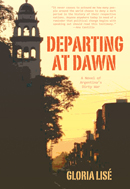
The 'Dirty War' of the late 1970s and early 1980s remains, to this day, a festering sore in Argentina's history. The systematic programme of 'disappearance', torture, rape, and murder of enemies of the military regime claimed tens of thousands of victims, many of whom are still unaccounted for. Gloria Lisé's book is set in 1976, as violence against ordinary Argentineans is increasing and an unwilling nation refuses to believe what is happening.
Although Departing at Dawn is about a horrible, brutal period, it is not a book about horror and brutality. In the opening sentence, Berta watches as her lover is thrown to his death from a balcony. That is the only violent event in the book. Believing that she is on the death squads' lists, Berta flees her hometown of Tucumán to live with her Aunt Avelina, far from the coming troubles. What follows is a well-crafted novel about how the innocent can be complicit in terrible crimes by their wilful ignorance. The farther they are from Tucumán, the easier it is for Berta's relatives to disbelieve reports of the reality engulfing Argentina. Rather than admit that her niece is a political fugitive, Avelina constructs soap operas about boys and broken hearts to explain Berta's flight. When a bishop is murdered, Avelina has no trouble denying it because she believes she does not live in the sort of country where bishops are murdered. The denial of Berta's problems becomes a metaphor for the denial of her country's woes.
Lisé's novel has ambitions far beyond its slender 175 pages. The author is perhaps guilty of
introducing too many narrative threads where few are needed. In truth, however, her observations
of her characters' awkward, adamant silences are captivating, and

Feminist Press, paperback, 9781558616035